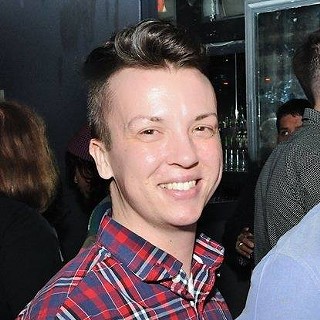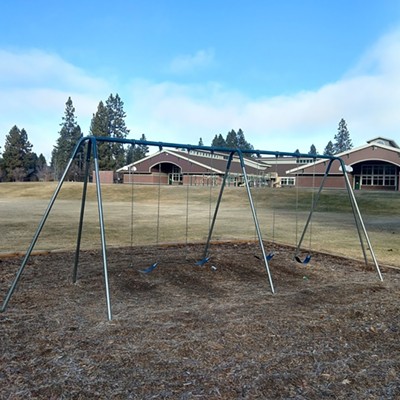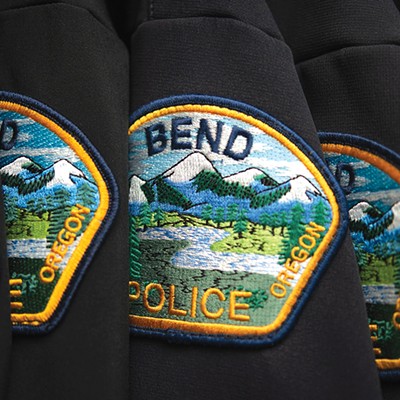Jodie Barram has no illusions about what government can do. She says she knows the power of public office is in the strength of connections between agencies, the crafting of infrastructures, and the support of effective policies. Though she claims to love city politics—she's served as a city councilor and mayor pro-tem for the past six years—she's enthusiastic about the possibilities a county-wide office would hold. That's why she's running for Deschutes County Commissioner.
Barram currently works part-time as an educational assistant, but says she'll dedicate herself to public service full-time if she wins the election against incumbent Tony DeBone. A resident of Bend who has lived in cities across the county, Barram sat down with us to talk about what she's doing now to advance the issues she's passionate about.
The Source: So, what would you say is your top issue?
Jodie Barram: Jobs is going to be a big one.... My top three are livability, higher education, and jobs. [She pulls out a map of Bend's "enterprise zones..."] This is one of my favorite tools as an elected leader, because government doesn't really create the jobs, the market does that, or the companies that come here do that. So as a government, enterprise zones are one way for us to have a tool—a tax incentive—where we get out of the way, cut the red tape, and if you're a business that provides a living wage job you get tax abatement and we get productive citizens in our community.
SW: Where does your interest come from in working on economic development and job growth?
JB: A lot of it came out of Bend 2030. I've been with that organization since its inception in 2005. Over the past year, couple years, I had worked in the vibrant economy focus area. I got involved with vibrant economy and saw all this opportunity, which also ties into why I'm such a supporter of higher education...whether it's four years or two years, you have an institution that attracts a faculty and has services in and of itself as an industry, but also gives us an educated workforce to feed into our market....
It's a great political platitude to say, "I want to diversify the economy. I want to bring different businesses." That's where, at the county level, it's so cool, because you have all these different personalities, these different cities. You have Redmond, which is so different from Bend, you have Sisters, which is so different from Bend, La Pine, and then the unincorporated ones, Terrebonne and Tumalo, but you still, like out in Terrebonne, some of the farmers where I get some of my produce from, are making it, growing organic food to put into our food supply here locally, and that is so cool. Could we do that here in the city of Bend? We have Fields Farm, but that's not going to feed everyone in Bend...
Part of why I ran in the first place back in 2008 is because I have grown up here. [I remember] reading documents when I was on the planning commission that were from the '80s, and I recognized names of some people who knew my parents and grandparents because they were here then and I realized, I'm 35, and I'm sitting there and it was this a-ha moment and I realized that I am the grown-up generation dealing with their decisions, good or bad, and I have two kids of my own and I want to leave this community, this area, in a better place for them and hopefully their kids. So it's that long-term thinking for me that is paramount to being an elected official. It's not about me at all, it's about the public, and what role can I take to advance the public good. And that's what's so much fun about being in local government at the county and city levels—you get to have that impact, you're right there, you're people's neighbor and you're living it.
SW: What are you doing right now to work toward job growth and development, on a day-to-day level?
JB: On a day to day, at the city level, it's still supporting things like the enterprise zones, supporting policies like our system development deferral program for people that are building in this area as we're managing growth, so we're still collecting the fees but it eases the financial strain on our customers. And then meeting with people that are interested in having a business presence here. Like just the other week, Roger Lee from EdCo pulled me and mayor [Jim] Clinton and Melanie Widmer, the Madras mayor, to meet with the [Japanese] Consular General of Portland about Japanese business and trade with this region. It's [about] showing up in that capacity and reaching out in that capacity as we need to. Of course, I sit on the Visit Bend board, so tourism is a big component and I have a bit of a background in that, running a bed and breakfast, working at a hotel. And seeing visitors come and fall in love with this postcard place we live in is so cool, and then how do we manage that? So using tourism as a sort of means to an end—as an industry itself it's hugely successful here—but having people come and enjoy their experience here is something I love doing.
SW: What was the first time you got involved in this type of work?
JB: Back in 2004, when Juniper Ridge was a big topic for this area and I lived in NE Bend, the meetings got to be invitation only and as a member of the public I wasn't invited, so I had to send my thoughts with somebody who was. And that is what initially got me interested in applying for the planning commission for the City of Bend and I was appointed at the end of 2004. So that was the start. I did not ever plan to be a public official. I didn't come out of high school thinking this is what I want to do. But serving on the planning commission—land use policy is so fascinating in this state, and working to protect natural resources is such a big component of living and living here in particular—so that's what got me started, and then I was asked to run for City Council in 2008.
Stay tuned for more Whatcha Doing, Candidate?, a series of Q&As with the candidates on their most important issues.



![My View: Emerson Levy, Oregon House District 53 Democratic candidate ▶ [with video]](https://media1.bendsource.com/bend/imager/my-view-emerson-levy-oregon-house-district-53-democratic-candidate-with-video/u/r-bigsquare/13468288/screen_shot_2020-10-19_at_4.01.19_pm.png?cb=1680199408)

![My View: Anthony Broadman, Bend City Council Pos. 2 candidate ▶ [with video]](https://media1.bendsource.com/bend/imager/my-view-anthony-broadman-bend-city-council-pos-2-candidate-with-video/u/r-bigsquare/13400361/screen_shot_2020-10-07_at_5.12.35_pm.png?cb=1680199414)




















